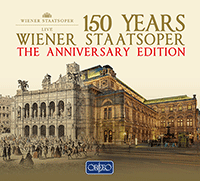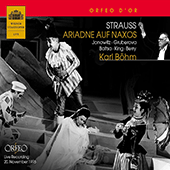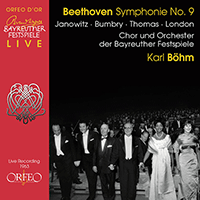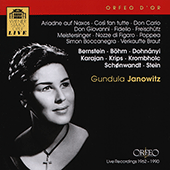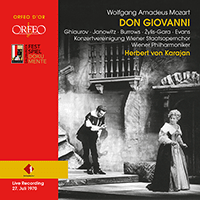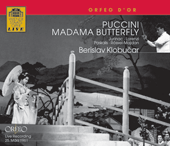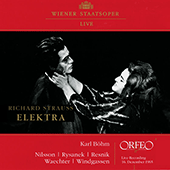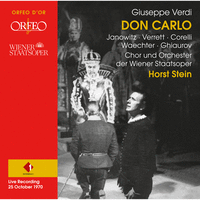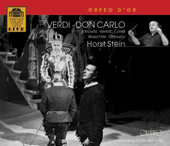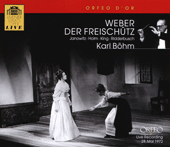Gundula Janowitz
Gundula Janowitz spent her youth in Graz, Austria, becoming a naturalized Austrian citizen. Following the death of her father, she worked as a shorthand typist, but studied singing at the Styrian Conservatory in Graz with Herbert Thöny. With the financial help of the Wagner Society of Graz, she visited the Bayreuth Festival in 1959 and after being heard by Herbert von Karajan was immediately engaged to sing at the Vienna State Opera in 1960, making her debut as Barbarina / Le nozze di Figaro. She was to be closely associated with this company, of which she became a permanent member in 1962 and a Kammersängerin in 1970, for the next thirty years. Other early roles at Vienna included Pamina / Die Zauberflöte, Dido / Dido and Aeneas (Purcell), Mimì / La Bohème and Marzelline / Fidelio.
Janowitz’s rise to prominence was rapid: as well as singing at the Vienna State Opera and at Bayreuth (Flower Maiden / Parsifal, Woglinde / Der Ring des Nibelungen, 1960–1962), she made guest appearances at Graz, Hamburg and Munich and also sang with the Frankfurt Opera between 1963 and 1966. During 1963 she took part in the Aix-en-Provence Festival as Pamina and the Salzburg Festival as Countess Almaviva / Le nozze di Figaro; and appeared at the Glyndebourne Festival in 1964, singing Ilia / Idomeneo opposite the young Luciano Pavarotti as Idamante. In the same year in Vienna she fortunately survived the experience of singing, at the instigation of Karajan, the Empress / Die Frau ohne Schatten, withdrawing from the scheduled performances after the dress rehearsal.
Her Metropolitan Opera debut came in the autumn of 1967, also with Karajan conducting. Her role was Sieglinde / Die Walküre, which Janowitz also sang at the Salzburg Easter Festivals of 1967 and 1968. A frequent participant at the Salzburg Festival, her roles here included Donna Anna / Don Giovanni (1968–1970), Fiordiligi / Così fan tutte (1968–1972), Countess Almaviva (1970–1971), the Marschallin / Der Rosenkavalier (1978–1979) and Ariadne / Ariadne auf Naxos (1980–1981). In addition she gave regular concerts at the Festival throughout her career, becoming an especially notable interpreter of Schubert lieder and of Richard Strauss’s Vier letzte Lieder.
Outside the festival circuit Janowitz sang regularly with the Deutsche Oper, Berlin from 1966, enjoying great success both in Berlin and Vienna during 1969 as Amelia / Simon Boccanegra, after which she ventured more frequently into the Italian repertoire. She sang the Countess in the legendary production of Le nozze de Figaro directed by Giorgio Strehler and conducted by Sir Georg Solti, which in 1973 inaugurated the Rolf Liebermann era at the Paris Opera; and made her debut at the Royal Opera House, London as Donna Anna in 1976.
During the latter part of her career Janowitz gravitated to heavier roles, including Agathe / Der Freischütz, Ariadne / Ariadne auf Naxos, the Countess / Capriccio, Desdemona / Otello, Elisabetta / Don Carlo, Elisabeth / Tannhäuser, Leonore / Fidelio, Odabella / Attila and the title roles of Aida and Arabella. She visited Japan in 1986 with the Vienna State Opera, singing the Marschallin, and in 1987 appeared in her final new production at Vienna, as Klytaemnestra in Gluck’s Iphigenie in Aulis. In the same year she also appeared at the Mörbisch Operetta Festival in the title role of Kálmán’s Gräfin Mariza. She made her formal farewell to the operatic stage in 1990, but continued to give occasional concerts and served as director of the Graz-Steiremark Theatre from 1990 to 1991.
Janowitz’s voice was notable for a bright, pure tone and a rapid vibrato which endured throughout her career: combined, these communicated a sense of great emotional intensity. She arguably possessed one of the most beautiful voices of her generation.
© Naxos Rights International Ltd. — David Patmore (A–Z of Singers, Naxos 8.558097-100).








